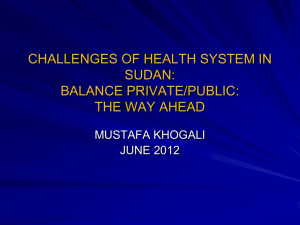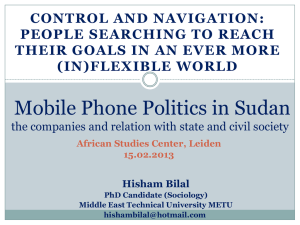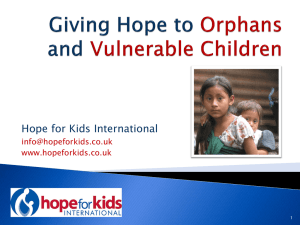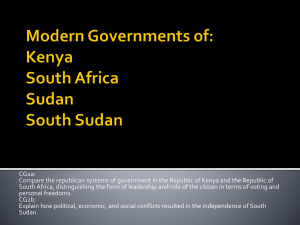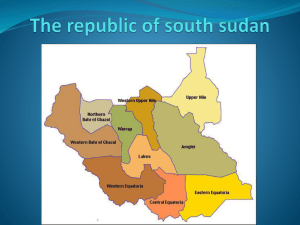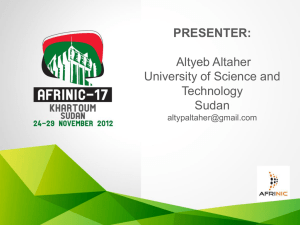combating hiv.aids, malaria and tuberculosis in the arab world
advertisement
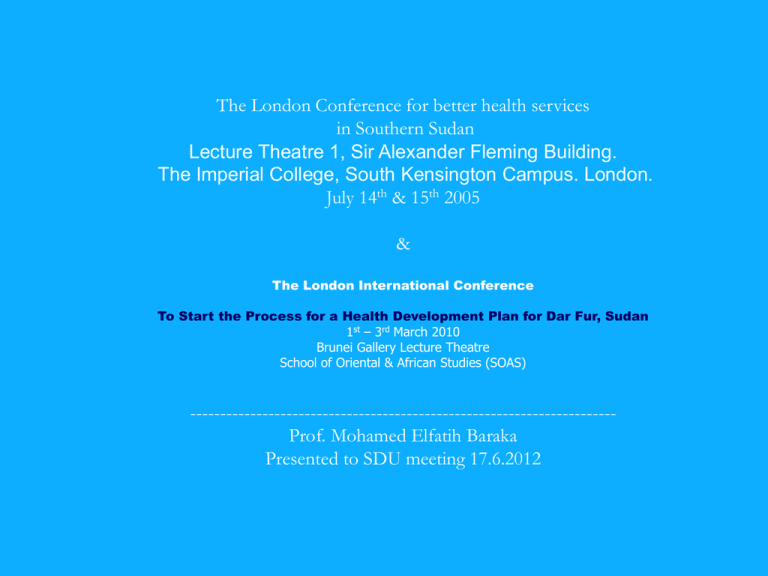
The London Conference for better health services in Southern Sudan Lecture Theatre 1, Sir Alexander Fleming Building. The Imperial College, South Kensington Campus. London. July 14th & 15th 2005 & The London International Conference To Start the Process for a Health Development Plan for Dar Fur, Sudan 1st – 3rd March 2010 Brunei Gallery Lecture Theatre School of Oriental & African Studies (SOAS) ----------------------------------------------------------------------Prof. Mohamed Elfatih Baraka Presented to SDU meeting 17.6.2012 British & American Friends of Southern Sudan (BAFOSS) The London Conference for better health services in Southern Sudan Lecture Theatre 1, Sir Alexander Fleming Building. The Imperial College, South Kensington Campus. London. July 14th & 15th 2005 Dr. John Garang said: “It is up to the North to make unity attractive to people in the south.” And that is what I have tried to do It does not look nice at all….. Dr Zachariah Bol-Deng Represented: The 1st Vice President of the Sudan Dr John Garang De Mabior Dr J.G. De Mabior vision when he addressed the people upon his return to Khartoum in 2005: Access to clean water and food for all Mother and child care, including vaccines available to all. Providing methods of preventing and treatment of major diseases like malaria, diarrhoeal diseases, TB, H.I.V/aids, leishmaniasis, schistosomiasis, trypanasomiasis and other major killers in one country. Encouraging health education, not only in schools but for all adults especially women. BAFOS London Conference for better health services in Southern Sudan (July 14-15, 2005) Dr. Omer Sulieman M. Omer Consultant WHO advisor Community –based comprehensive health strategy for Southern Sudan. HEALTH SYSTEM & HEALTH CARE IN FUTURE SUDAN: CASE STUDY OF SOUTHERN SUDAN Dr. Mustafa Khogali July, 2005 LONDON Objectives To address key health challenges and barriers. To provide a useful framework based on MDGs and its indicators. To provide and explore options on the basis of new goals for Health System (in NS and SS) To outline priority areas. Recommendations H. Secretariat of SS: 1. Should not promise to deliver more than it can 2. Review priorities of the Basic health Service Package to be provided comprehensivley through a team. 3. Develop a schedule for phasing its components 4. Outline clear policy guideline for combating the communicable diseases specially Malaria, TB & HIV/AIDS 5. Enhance Community Participation at all level. 6. Review carefully the place of specialized vertical programs. 7. Establish a functional HIS. 8. Develop a research agenda. Health Services in Southern Sudan Where to start & which way forward? Prof Hassan Bella College of Medicine King Faisal University Saudi Arabia The Wish Carol Bellamy Director General, UNICEF “The day will come when nations will be judged Not by their military or economic strength; Nor by the splendour of their capital cities & buildings, But by the well being of their people, By their levels of health, nutrition & education, By their opportunities to earn a fair reward for their labours, By their ability to participate in the decisions that affect their lives, By the respect that is shown for their civil & political liberties, By the provision that is made for those who are vulnerable & disadvantaged, & By the protection that is afforded to the growing minds & bodies of their children.” Health in Post Conflict Southern Sudan Reasons for Hope _ _ _ _ _ _ _ Mamoun Homeida, Academy of Medical Sciences and Technology. The London International Conference on the Establishment of Better Health Services in Southern Sudan. London 14-15 July 2005 Humanitarian Impact of the War in Sudan 2 million people killed 4 million displaced ¼ million child soldiers ½ million street children War traumatized victims (phys / Psych.) Dramatic increase in women – headed households Trachoma Trypanosomiasis 750,000 patients Where are the tsetse flies in Sudan? Distribution of tsetse flies Onchocerciasis The Way Forward Many meetings, conferences, held on behalf of the Sudanese. In Michigan, Nairobi, London (RCP – December 2004), London July 2005 Efforts to be coordinated by the National Ministry of Health, OR Ministry of Health in SS. (Khartoum – Rumbuk – Juba) Preliminary strategic plan for health should be laid down based on the scattered data on prevalence/morbidity/mortality of diseases. Partnership with NGDOs, UN agencies private sector should be created to cater for different sectors of the region or diseases but avoid vertical approach for control of diseases. All activities should be lead/spear-headed by the National Ministry of Health / in full Ministry of Health GOSS. Full utilization of National resources in the country especially in relation to human resources Community participation and empowerment to maintain a sustainable health care delivery. Disease control programmes should be a response to problems perceived by the communities and they must be carried out in a way which is acceptable to the community members. (We have an excellent example in CDTI (onchocontrol) BAFOSS conference on establishment of better health services in Southern Sudan July 14 and 15 2005 A call to target infectious and parasitic diseases A. Fenwick, D. Molyneux and P. Hotez Presented by Professor Alan Fenwick Department of Infectious Disease Epidemiology Imperial College London Imperial College London 24 The Neglected Tropical Diseases There are 13 Tropical Infections to be considered. They …. afflict the poor and powerless are in rural areas of low-income countries cause immense suffering and life-long disabilities impair childhood growth and development promote poverty and impair education and economic development do not receive appropriate attention and funding (unlike HIV/AIDS, TB, Malaria) do not support commercial markets for drugs or vaccines 25 Imperial College London Onchocerciasis Lymphatic Filariasis Guinea Worm Schistosomiasis Trachoma 4.2 billion people in 142 countries 27 Imperial College London Addressing the Poverty Agenda The Millennium Development Goals MDG 1: MDG 4: MDG 5: MDG 6: MDG 8: Eliminate extreme poverty and hunger Reduce child mortality Reduce maternal mortality Combat HIV/AIDS,TB and Malaria and other diseases Develop a global partnership for development In line with recommendations from the Commission for Africa Donors should ensure that there is adequate funding for the treatment and prevention of parasitic diseases and micronutrient deficiency. Governments and global health partnerships should ensure that this is integrated into public health campaigns by 2006. *Priority Health Care Package For Post-war South Sudan* Presented by:CONSTANTINE JERVASE YAK Associate Professor Department of Surgery Faculty of Medicine The Academy of Medical Sciences & Technology Khartoum - Sudan RESOLUTIONS That the Government Of South Sudan (GOSS):Must first demonstrate the political will necessary to develop an effective health care system, at affordable costs, and with accessible services distributed equitably within its community. On Health Care System: That the only working health care system in South Sudan is the Primary Health Care, having been earlier launched successfully during the peaceful times. Its proper implementation should be able to ensure the presence of a health facility (PHCU) in every village, with a strong community involvement and a proper ladder-pattern referral system. On Preventive Medicine: That Health promotion and disease prevention should form the basis for medical services as they relate to wider local and national communities. If we are to contribute effectively to the urgent needs of our beleaguered people, we cannot merely transfer and apply elaborate curative medical technology. This would be inappropriate because it distracts from their basic public health needs. On Health Training Institutions: Relocation of the high institutes of education, now stationed in North Sudan, back to South Sudan, and the creation of much more needed health training facilities of other categories. HEALTH FACILITIES AND HEALTH MANPOWER IN THE SUDAN: PROBLEMS AND PROSPECTS The London International Conference on the Establishment of Better health services in Southern Sudan: July 14-15, 2005 Professor Ahmed Bayoumi: DPH, MD, FFPHM, FACTM Professor of Health Care Epidemiology Medical and Research Centre (MRC) Table 2: Health facilities by region Region 1. Northern 2. Eastern 3. Central 4. Khartoum 5. Kordofan 6. Darfur 7. SS Total SH GH RH HC RD Total % 2 5 48 194 225 474 18.8 5 8 38 98 158 307 12.2 10 13 54 250 474 801 31.8 19 13 7 131 161 331 13.2 2 5 24 94 177 302 12.0 1 6 22 44 130 203 8.1 0 16 1 40 40 97 3.9 39 66 194 851 1365 2515 100.0 The Burden of Trachoma in Southern Sudan Photo by: J.Ngondi 15th July 2005, London By: Dr. Jeremiah Ngondi Onchocerciasis Control in South Sudan Dr Adrian D. Hopkins M.R.C.Ophth., D.O., D.T.M&H. Dr Sansom Baba M.D., M,P.H. Mr Fasil Chane. Ad Dipl: Env. Sc. VISION 2020 A plan for blindness prevention in South Sudan Dr Adrian D. Hopkins M.R.C.Ophth., D.O., D.T.M&H. Ms Marcia Zondervan R.N., D.T.M&H., D.C.E.H., M.B.A. Dr Sansom Baba M.D., M,P.H. BAFOSS International Conference- London 14/7-15/7/2005 Post-conflict Response to HIV/AIDS Epidemic in Southern Sudan Isam M A Salam Elwathig Bellah Ali Mohamed Siham Gaber Mohamed Sidahmed Constantine Jervase Yac Tribal Teeth Extraction A Custom Prevalent Amongst the The Dinka & Neur Tribes By Dr Lena Baraka BDS 15.07.05 London BAFOSS 41 Why attention to reproductive health is vital to the future of Sudan? Dr. Nahid Toubia President & CEO RAINBO Health and Rights for African Women www.RAINBO.org A REALISTIC STRATEGIES FOR SHAPING HEALTHIER FUTURE OF SOUTHERN SUDAN: “CHALLENGE TO THE MEDICAL SCHOOLS OF THE SOUTH”. PROFESSOR ELBAGIR ALI A. ELFAKI MBBS.FRCS.FRCSI.FACS. Faculty of Medicine & Medical Sciences UMM-Al-qura University , Makkah, Saudi Arabia. A Floating Laboratory Along the White Nile A recommendation from The BFOSS conference for the development of better health services in Southern Sudan. Held in London July 2005. Background Welcome Floating Laboratory Suggested Routes 1. Malakal-Juba 2. Malakal Nasir John Angul, Minister of Health And the personal envoy of Omar AlBashir, to the conference: Announced that he will fund the project !!! Conference recommendations: The recommendations are grouped according to the five areas of key challenges: Health system and Health Service Delivery: – – – – – – – – – Review priorities of the basic health service package to be provided comprehensively through a team. Preliminary strategic plan for health should be laid down based on the scattered data on prevalence/ morbidity/ mortality of diseases. Establish a functional Health Information System. All activities should be lead/spear-headed by the National Ministry of Health/ in full Ministry of Health GOSS. Enhance community participation and empowerment to maintain a sustainable health care delivery. Partnership with NGOs, UN agencies private sector should be created to cater for different sectors of the region or diseases. It is sensible to avoid “vertical” approach for disease control, but eradication of polio and Guinea worm disease require special prioritization and urgency. PHC to be addressed and improved in a wider framework of integrated rural development strategy with intersectoral collaboration. Stakeholders should prepare to cope with expected demanded services. Establish/strengthen partnerships within Health authorities/ community, health related sectors and NGOs. – Early involvement of health authorities, other sectors & the community. – We should think of regulatory bodies from day one. – Improvement of the poor coordination of the hospitals in SS for a better service delivery. – Simple structures can be defined and must be defined to ensure that patients receive the best possible medical care with available resources. – Consider Reproductive health as an essential health care component. – Develop a research agenda. – Build research capacity for control of tropical diseases in the south of Sudan. – Develop or create research institutions in SS. 2. Infections and Endemic Diseases Epidemiological baseline data is needed across SS for all diseases so that treatment programmes and drug delivery can be planned. – Maps of endemic diseases, STIs and HIV/AIDs should be constructed. – Review carefully the place of specialized vertical programs – Outline clear policy guidelines for combating communicable diseases especially Malaria, TB & HIV/AIDs. – The development of appropriate strategies for targeted disease control integrated into the developing PHC structure. – Support the VISION 2020 approach to prevention of avoidable blindness and encourage the development of the SS programme through VISION 2020 goals and coordination with the VISION 2020 plan already prepared by GOS. Development of VISION 2020 Links Programme for support in training. – Partnerships be fostered to include all stakeholders in technical and financial support of the VISION 2020 programme. – Strengthen the mapping of trachoma in Southern Sudan and apply SAFE strategy in all endemic areas through the Primary Care component of PHC. – Onchoceriasis: Continued development of the 5 APOC projects and integration as soon as possible of the former programmes in GOS/SPLA areas of SS. – HIV/AIDs is potentially explosive as the displaced and possibly infected persons return to SS. Surveillance is essential and ARVs are urgently needed. – Scaling up activities in Juba to prevent the spread of HIV/AIDs by implementing behavior and attitude changes in the general population. – Onchoceriasis: Continued development of the 5 APOC projects and integration as soon as possible of the former programmes in GOS/SPLA areas of SS. – HIV/AIDs is potentially explosive as the displaced and possibly infected persons return to SS. Surveillance is essential and ARVs are urgently needed. – Scaling up activities in Juba to prevent the spread of HIV/AIDs by implementing behavior and attitude changes in the general population. – Advocate increased collaboration between human and veterinary medical programs in addressing 200 NCD e.g TB, Trypanosomiasis and Brucellosis. – The fight against HIV/AIDs should be started in other towns in the Southern Sudan. – Collaboration with Uganda should be mandatory to benefit from their experience in keeping the epidemic at controllable level. – Coordination of four drug distribution initiatives and combine them to reduce costs and prices of drugs. – Purchase of CD4 cells counter and antiretroviral drugs should be availed as this will encourage voluntary testing & control thereafter. – Concerted efforts are needed to identify and contain sources of Guinea Worm infection and polio so this scourge can be eradicated quickly. – Encouragement and establishment of the laboratories as basis of diagnosis. – Standardization and development of Floating Laboratories & clinics – Critical need for more and safe blood in all areas of Sudan. – The Southern Sudanese government must acknowledge and work tirelessly to halt any HIV/AIDs epidemic. – Create a research environment for control of tropical diseases. – R & D essential for evidence based policy for control of tropical diseases should be included in long term health plans for SS. – We have tools to improve health by treating parasitic infections. We should use them without delay. 3. Health Expenditure – Financial support should be shared between the government of SS, international donors and NGOs. – Engage private enterprise, with corporate social responsibility to participate in effective health care delivery. – Let’s budget for each recommendation. 4. Human Resources – Full utilization of National resources in the country especially in relation to human resources. – Capacity building to be supported by experts in Sudan and international institutions. – Move the medical schools of Juba, Upper Nile and Bahr El Ghazal universities to the south as soon as possible. – Strengthening and supporting the capacity of the 3 universities in SS to train medical personnel to assist in the improvement of health services in the area and oversee the training of other health cadre. – Medical Schools should have strong community based curriculum. – Coordination body/board to formulate curricular priorities of all health schools and medical and coordination and facilitate the team work with early clinical and community work. – Primary health care approach should be the only approach to start with based on multidisciplinary, interdisciplinary and multi-sectoral. – Field training for students should have a high priority (strong emphasis) – Curriculum of all health schools (Medical and Health allied) – Twin-ship with medical schools in northern Sudan. 5. Disparity – Health delivery will be very much facilitated if the returnees were gathered in groups such as villages instead of unplanned return. – Try to distribute health care equitable between rural and urban and between the regions of Sudan. Priorities: Establishment of realistic goals & objectives. Careful, evidence-based prioritization of activities. Development and implementation of a comprehensive approach, as well as management at all levels through team work. Development of efficient information system to allow monitoring at all levels. Active Community Participation/Empowerment Establishment of Public Health Schools. They are critical and essential to the development of knowledge about health of populations and for training and capacity building. Reallocation of the 3 medical schools back to Southern Sudan. Establishment of laboratory services in SS will be of great importance in protecting public health. Collaboration of the government, the NGOs, universities of SS private sector and the international donors are needed to provide better health services. Strong emphasis on operational and applied research. BMJ 2005;331:179 NEWS ROUNDUP: Peter Moszynski Conference plans rebuilding of Southern Sudan's health services [Full text] Rapid Responses published: Establishment of better health services in Southern Sudan after the signing of the peace agreement Mohamad Baraka, Mustafa Khogali and Alan Fenwick (15 August 2005) Rapid Responses: Submit a response to this article The London International Conference To Start the Process for a Health Development Plan for Dar Fur, Sudan 1st – 3rd March 2010 Brunei Gallery Lecture Theatre School of Oriental & African Studies (SOAS) Together for Sudan Special thanks to Dr Lillian Craig Harris OBE, Director of the UK-registered Sudanese NGO ‘TfS’, and her husband Mr Alan Goulty, (formerly British Ambassador in Sudan) for their valuable assistance in securing the prestigious venue (SOAS) for the conference. The Darfur conference, March 2010 BFOS, Alahfad University, SOAS and DAN Health Services for Population in/after Crisis By: Dr. Omer Elhag Sulieman (tape) The impact of internal displacement (I.D) on mental health in Alginaina camps in Darfur. Sudan Dr. Ibtisam .A.Ali, D.Manal M Hisain, D.Yosif. A. Alwahab JASMAR Human Security Organization www.jasmar.net By : Dr. Hussein Elobeid hussein.elobeid@jasmar.net helobeid@hotmail.com The Federal Ministry of Health and Darfur Health Care: Interventions, Challenges and Prospects presented by Dr.Elsheikh Badr The London International Conference on Health Services in Darfur London SOAS, March 2010 Reproductive and Sexual Health in Sudan The Darfur Region Professor Hamid Rushwan International Federation of Gynecology and Obstetrics (FIGO) Obstetric Fistula Prevention and Treatment Services in Darfur Sudan Dr. Adam Salih Associated professor of obstetric & gynecology Director Fistula Centre North Darfur Dr. John Kelly Fistula Surgeon (UK) Dr. Ezizgeldi Hellenov UNFPA -Sudan 66 66 Patricia Parker, MBE 2 goats for every village Sustainable development at grass root level transforms village life in Dar Fur Patricia Parker, MBE, Kids for Kids, UK 2 midwifes for every village Towards Better Health Service and Healthier Future for Darfur. Professor Elbagir Ali A. Elfaki MBBS.FRCSI.FRCS.FACS. UMST. ALZAYTOUNA SPECIALIST HOSPITAL KHARTOUM, SUDAN. The London International Conference to Start the Process for a Health Development Plan for Darfur, Sudan 1- 3 March 2010 Some remarks concerning an adequate health and nutritional policy in Sudan Zygmunt L. OSTROWSKI and Marie-Christine JOSSE 2 Panel discussion sessions Panel Discussion 1 How to avail resources to support implementation of conference recommendations Panel Discussion 2 Health as entry point for peace in Dar Fur The recommendations meeting The conference recommendations Ensure that human resource imbalances in selected priority programmatic areas are addressed in an effective and comprehensive manner Develop effective prioritization system with special focus on areas related to mother and child health; as a start priority areas identified in this meeting including – Enhancing, supporting, and expanding midwifery and nursing training program in Darfur. Institutionalization of the midwives in the local health system – Support the integration of mental health programs at PHC services Institute an effective health delivery system which suits population in post conflict situation in partnership with communities and other stakeholders addressing social health determinants and basic development needs as a pre-requisite to health in three selected districts as a field demonstration in Darfur Introduction of the concept of health as a human right in general , health and medical education curricula Establish Partnership between MoH, DAN, BFOS ,AHFAD university and the health cluster which is lead by WHO and other NGOs to support the above recommendations and possibility of inclusion of these recommendations in their strategic plans Advocate for increased share for health sector from national budgetary allocation to reach Aboja recommendation in 2005 (15%) with special emphasis on Darfur Call on all those concerned to pay immediate attention to the health problems arising from draught The recommendations could be achieved through: The development of a clear implementation and follow up mechanism Adopt an integrated stratified approach towards addressing priority issues and ensure that this process is inclusive of all health partners the Sudanese in diaspora to work together to support the availability of adequate resources to support the implementation of the above recommendations BMJ Conference plans reconstruction of Darfur’s health services in wake of ceasefire. Peter Moszynski. BMJ 2010;340:c1150 Darfur's main rebel group signed a truce with Sudan's government this week, paving the way for a negotiated end to a conflict that has displaced millions of people and devastated the region. This “potential breakthrough” makes next week's London conference on rebuilding Darfur's shattered health services “exceptionally timely,” according to its organiser, Mohamed Baraka. Being held at London University's School of Oriental and African Studies from March 1-3, the conference is organised by the charity British Friends of Sudan, in collaboration with Sudanese community-based development agency Development Action Now, Sudan's Ahfad University for Women and the London Middle East Institute. Professor Baraka told the BMJ: “We welcome this latest agreement and hope it will develop into a lasting peace. The people of Darfur have suffered greatly for a long time. They need immediate and sustainable help, particularly in health care. Now is the time to begin to develop a health reconstruction plan for Darfur and we hope that this conference will assist in communicating to the outside world exactly what is required.” He said that “the key determinants of health are for the most part lacking in Darfur.” Basic minimum needs include: “primary health care, basic education, food security, water, healthy environment, adequate income, housing and safety as well as the rehabilitation and reconstruction of the infrastructure.”


